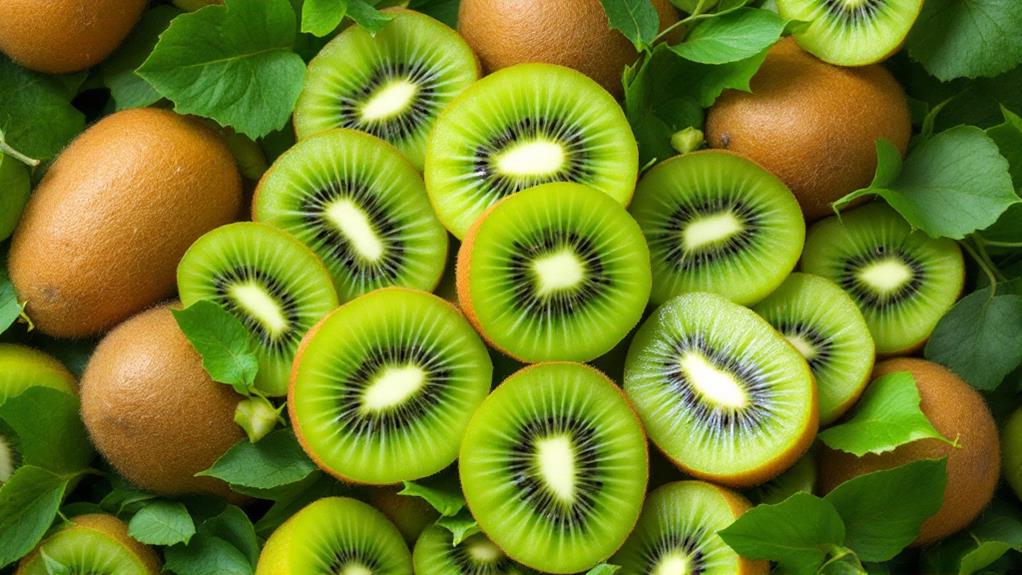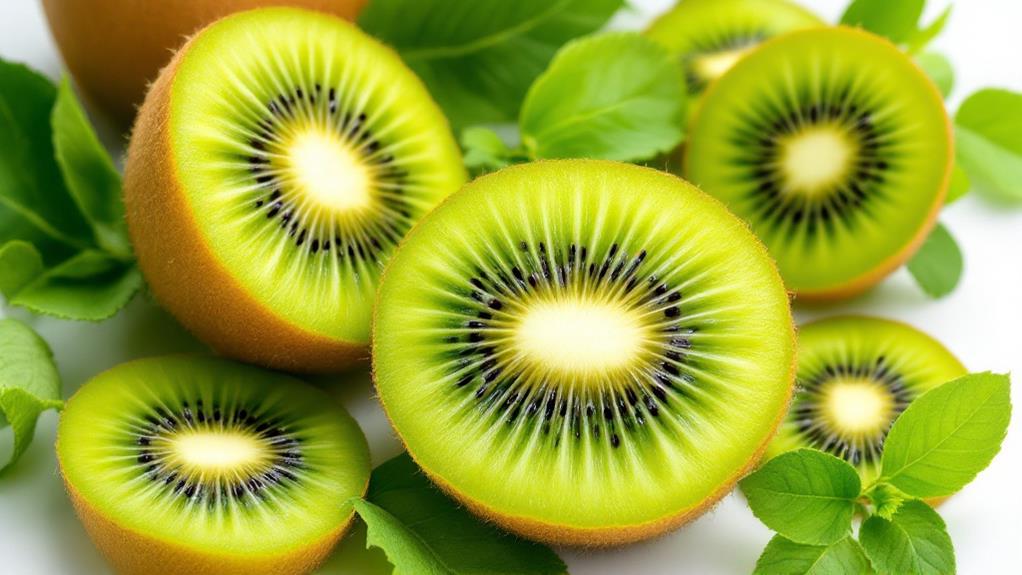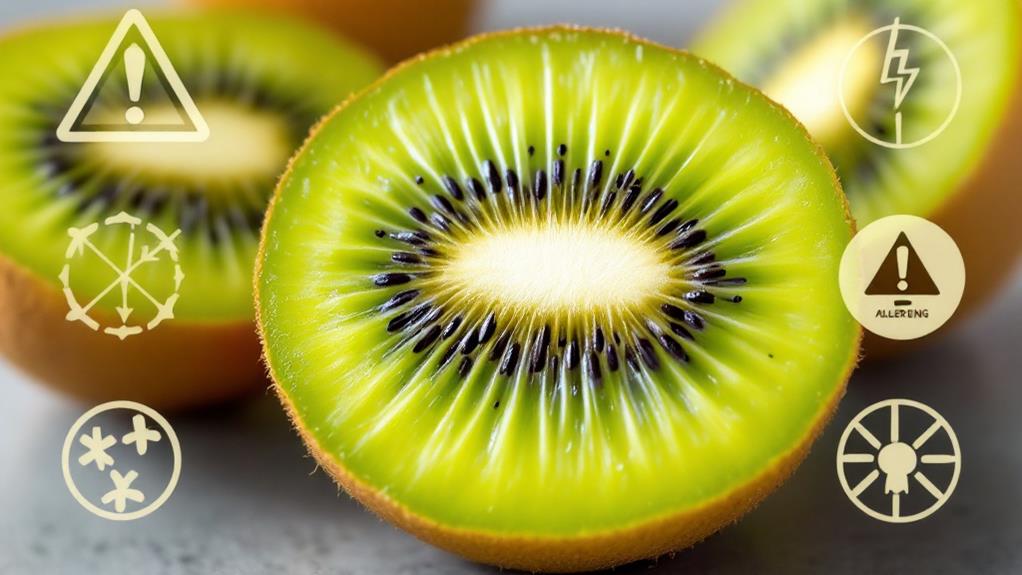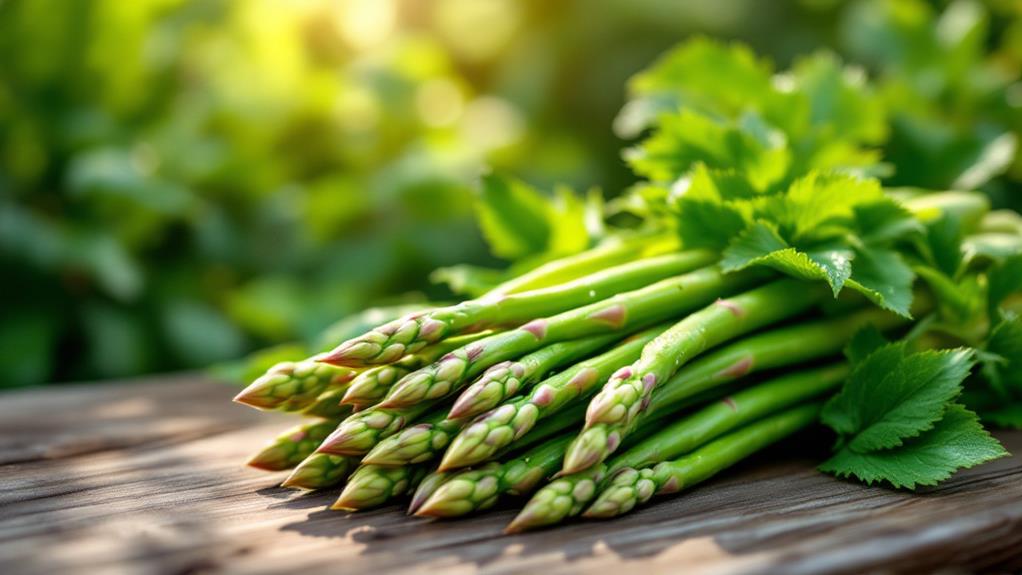The Ultimate Guide to the Types and Benefits of Kiwi

If you're curious about kiwi, you'll find it comes in exciting varieties like the popular fuzzy Hayward or the smooth SunGold with its tropical taste. Each kiwi is a powerhouse of nutrition, offering more than twice your daily vitamin C needs, fiber for digestive health, and potassium for your heart. Eating kiwi can enhance immunity, support digestion, and may even improve sleep. While naturally delicious raw or in smoothies, be mindful that some might experience allergies or digestive discomfort. Kiwis also offer environmental benefits, promoting biodiversity and supporting local farming. There's much to investigate about these remarkable fruits.
Kiwi Varieties and Origins
Kiwis, with their intriguing history and diverse varieties, showcase origins in northern China, where they were initially enjoyed for their medicinal benefits. This exotic fruit, once known as the Chinese gooseberry, made its way to New Zealand in 1904, thanks to Isabel Fraser. There, it was renamed "kiwifruit" in 1959, aligning with New Zealand's national symbol, the kiwi bird, to enhance its commercial appeal.
When exploring kiwi varieties, you'll find the Hayward kiwi, the most popular type. It's easily recognizable by its oval shape and fuzzy brown skin. This variety has become a staple in households worldwide due to its sweet and slightly tangy flavor. If you're curious about different textures, try the SunGold kiwi. Unlike the Hayward, it features smooth skin that you can eat whole, offering a tropical twist. For those in cooler climates, the Arctic kiwi stands out. It's smaller and robust, perfect for thriving in harsher weather conditions.
Since the 1940s, New Zealand has been at the forefront of commercial cultivation, transforming kiwis into a significant export product. The country's dedication to quality has made it one of the largest producers globally.
Nutritional Benefits of Kiwi
You'll often find kiwifruit as a nutritional powerhouse in a balanced diet. Bursting with vitamin C, a single medium kiwi offers 230% of your daily intake, strengthening your immune system and supporting collagen production. This tangy fruit is not just about enhancing immunity; it also excels in promoting digestive health. With about 2.1 grams of dietary fiber per fruit, kiwis aid regular bowel movements and help alleviate constipation.
When it comes to heart health, kiwi doesn't disappoint. Each fruit provides around 215 mg of potassium, a mineral that helps manage blood pressure levels. Plus, kiwis are low in calories, with just about 42 calories per fruit, making them a perfect healthy snack option. The antioxidants in kiwis, including lutein and zeaxanthin, are key players in fighting oxidative stress, potentially reducing the risk of chronic diseases.
Consider indulging in kiwis for:
- A stronger immune system: Thanks to that high vitamin C content.
- Improved digestion: Feel lighter and more comfortable.
- Enhanced heart health: Keep your heart in check with potassium.
Embrace these health benefits of kiwi and make this lively fruit part of your daily diet.
Health Advantages of Kiwi

Imagine a fruit that not only tantalizes your taste buds but also packs a punch in the health department—kiwi does just that. With an impressive 230% of your daily vitamin C requirement in just one fruit, kiwis are a powerhouse for enhancing your immune function and aiding in collagen production. These benefits are vital for maintaining overall wellness and warding off illnesses.
Kiwis are also a friend to your digestive system, thanks to their high fiber content of about 2.1 grams per fruit. Fiber promotes regular bowel movements and alleviates constipation, which is fundamental for digestive health. Furthermore, if you're concerned about heart disease, kiwis can help. Regular consumption has been shown to lower blood pressure and improve cholesterol levels, contributing to a healthier heart.
The antioxidants in kiwis, including lutein and zeaxanthin, play a significant role in reducing oxidative stress and lowering the risk of chronic diseases. These antioxidants also contribute to better sleep quality, as they work alongside serotonin to help those with sleep disturbances. By integrating kiwis into your diet, you're taking a delicious step towards improved health and well-being.
Ways to Enjoy Kiwi
After exploring the impressive health advantages of kiwis, let's turn our attention to the diverse delightful ways you can enjoy this nutritious fruit. Start by savoring kiwis raw; just slice them in half and scoop out the lively green flesh with a spoon. This method maximizes their tart flavor and vitamin C content. For a colorful, sweet-tart twist to dishes, try incorporating diced kiwi into fruit salads. The bright color and nutritional benefits, including high fiber and antioxidants, make it a perfect supplement.
If you're looking for a revitalizing drink, blend kiwis into smoothies. This not only adds a delightful flavor but also improves the nutrient profile with vitamin C and potassium. You can also enjoy kiwi slices as a frozen treat. Freeze them for a cool snack that retains their nutritional benefits. Pairing kiwis with creamy Greek yogurt creates a fantastic snack, combining the fiber and vitamin-rich properties of kiwi, promoting digestive health.
Consider these delightful ways to enjoy kiwis:
- Raw and Tangy: Scoop out the vitamin-rich flesh.
- Fruit Salad Surprise: Add diced kiwi for color and flavor.
- Smoothie Sensation: Blend for a nutrient-packed drink.
Potential Risks and Allergies

When enjoying kiwis, it is essential to be aware of potential risks and allergies associated with this fruit. Kiwi allergy can manifest through a range of reactive symptoms, from mild issues like an itchy throat and swollen tongue to severe responses such as hives, vomiting, and difficulty breathing. Actinidin, a major allergen in kiwis, can trigger these reactions. Approximately 1 in 100 people might experience a kiwi allergy, often linked to pollen food syndrome, especially in individuals sensitive to birch pollen.
If you're taking blood thinners like warfarin, be cautious with your kiwi intake. This fruit is rich in vitamin K, which can interfere with your medication's effectiveness. Additionally, kiwis have high oxalate levels, posing health risks for those prone to kidney stones, so moderation is key.
Excessive kiwi consumption can also lead to digestive discomfort. You might encounter symptoms like bloating and diarrhea, particularly if you're sensitive to fiber. Individual sensitivity differs, so listen to your body and adjust your intake as needed. By staying informed about these potential risks, you can enjoy kiwis safely and maintain your well-being.
Environmental Impact of Kiwi
Kiwifruit cultivation, aside from providing delicious and nutritious produce, plays a significant role in promoting environmental sustainability. By embracing sustainable agricultural practices, kiwifruit farmers manage to keep pesticide residues low, as evidenced by the fruit's inclusion in the EWG's 2019 Clean Fifteen. This minimal chemical usage not only reduces environmental impact but also supports healthier ecosystems.
Organic farming of kiwifruit further diminishes its carbon footprint, as these methods typically require less energy and reduce emissions. The fruit's ability to thrive in varied climates bolsters biodiversity, allowing local ecosystems to flourish and promoting the use of local agricultural resources. This supports farmers and minimizes the need for long-distance transportation, cutting down on associated carbon emissions.
Kiwifruit orchards contribute to soil health by preventing erosion and promoting nutrient cycling through their robust root systems. They help maintain the land's fertility and guarantee its productivity for future generations. When you choose kiwifruit, you're making a conscious decision to support:
- Healthier soil that nurtures future crops.
- Local farmers who rely on sustainable methods.
- A cleaner environment with reduced carbon emissions.




